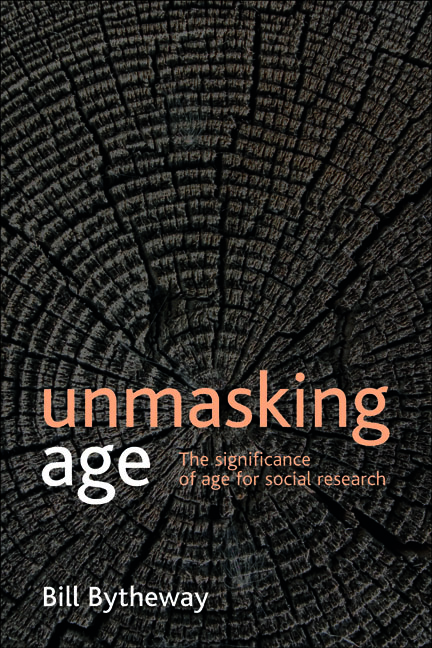Book contents
- Frontmatter
- Dedication
- Contents
- List of figures and tables
- Acknowledgements
- one Introducing age
- two Researching age
- three Age and time
- four Representations of age
- five Growing older in an ageing body
- six Being older
- seven A great age
- eight The ageing population
- nine Gerontologists and older people
- ten Getting real
- Postscript
- Notes
- Appendix
- References
- Index
nine - Gerontologists and older people
Published online by Cambridge University Press: 07 September 2022
- Frontmatter
- Dedication
- Contents
- List of figures and tables
- Acknowledgements
- one Introducing age
- two Researching age
- three Age and time
- four Representations of age
- five Growing older in an ageing body
- six Being older
- seven A great age
- eight The ageing population
- nine Gerontologists and older people
- ten Getting real
- Postscript
- Notes
- Appendix
- References
- Index
Summary
In this penultimate chapter I want to discuss the relationship between gerontologists and older people. There is in this a classic example of ‘us and them’. As Margaret Simey commented a few years ago, when addressing the annual conference of the British Society of Gerontology:
“For us, ‘we’ are older people and gerontologists are ‘them’.”
To overcome this harsh divide, there have been moves to promote ‘participative research’ through projects in which older people are actively involved in ways other than just as research subjects. The RoAD project is a good example, and I have little doubt that the outcomes would have been very different had the project not involved older people from the outset. It was funded according to a planned schedule and specific aims and it had a budget to cover the expenses of all the various participants. The entire project was undertaken jointly with Help the Aged and many (but not all) of the older people who took part were members of the local forums that Help the Aged supported.
One consequence of such collaboration is that as researchers we may find ourselves engaged in tasks and situations that cannot be easily justified in terms of the agreed contract. Nevertheless, they provide many insights into the wider context of the issues being researched. In addition, we may find the tables being turned and questions being posed about our involvement and commitments. Here is one example drawn from a long-running involvement that I had in the 1970s and 1980s with Age Concern.
In 1974, when at Keele University, I undertook a project for Age Concern researching the attitudes and priorities of its many local groups. A year later I moved to University College Swansea and, shortly after arriving, members of Age Concern West Glamorgan reminded me that they had responded to the Keele enquiry. When they asked me if I would join their committee I was pleased to accept. In 1978 a bid to the Welsh Office for the funding of a Hospital Discharge Scheme was accepted. I saw the setting up of this scheme as an opportunity to develop a proposal for funded research into hospital discharge and community-based care.
- Type
- Chapter
- Information
- Unmasking AgeThe Significance of Age for Social Research, pp. 187 - 206Publisher: Bristol University PressPrint publication year: 2011



